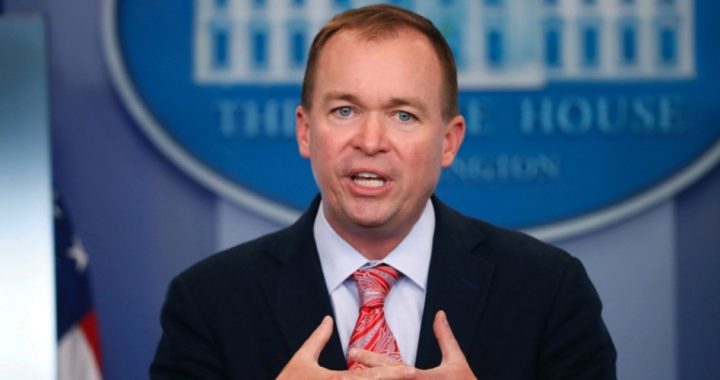
Speaking with Jake Tapper on CNN’s State of the Union on November 19, the Trump administration’s director of the Office of Management and Budget (OMB), Mick Mulvaney (shown), said that the White House is open to removing a repeal of the Affordable Care Act’s (ObamaCare) individual mandate from the legislation crafted by Senate Republican leaders to overhaul the nation’s tax laws if that provision becomes an obstacle to the bill’s passage.
“If we can repeal part of ObamaCare as part of a tax bill and have a tax bill that is still a good tax bill, that can pass, that’s great,” said Mulvaney. “If it becomes an impediment to getting the best tax bill we can, then we are okay with taking it out.”
When Tapper asked Mulvaney if he thinks having the removal of the mandate in the tax bill is an impediment to its passage, he said:
I don’t, actually, because I think you also heard Senator [Susan] Collins [R-Maine] say something very important, which is that, when we get rid of — if they do get rid of this penalty, the folks who benefit from that are predominantly folks who make less than $50,000 or $100,000 a year.
I think 58 percent of the folks who pay the fine make less than $50,000, and almost 80 percent of the people who pay that fine today make less than $100,000. So, there’s actually a benefit to folks if the repeal goes away.
But, again, it’s up to the House and Senate to try and hammer through those details.
As for the House and Senate hammering through the details of a tax bill, we reported on November 16 that the House passed a major tax overhaul bill that day that would cut taxes more than $1.4 trillion over 10 years. Though that bill passed by a near-party line vote of 227-205, a handful of Republicans from high-tax states voted against the bill because it eliminates tax deductions for state and local income and sales taxes and also limits property tax deductions to $10,000.
As we reported, however, reconciling the House-passed bill with a version still to be hammered out in the Senate will prove to be more difficult than obtaining passage in the House. The New York Times reported that Republicans must reconcile the House legislation with a bill still being considered by the Senate Finance Committee, which contains substantial differences that will have to be overcome. One major difference is that the House bill does not include a repeal of the Affordable Care Act’s individual mandate.
Senate Republican leaders moved on November 14 to include a repeal of the individual mandate in their tax bill, a strategy that the Washington Post described being designed to “accomplish two of their top domestic priorities in a single piece of legislation.”
However, including this provision also poses risk and may jeopardize the bill’s passage.
Senator Collins, one of the Republicans who opposed earlier attempts to eliminate ObamaCare, said that including the repeal measure “complicates” the tax effort. However, she suggested she might be able to support the bill if the Senate also passes a bipartisan bill to preserve other aspects of the Affordable Care Act.
Senator John McCain (R-Ariz.), who, along with Collins and Senator Lisa Murkowski (R-Alaska) voted down an Affordable Care Act repeal effort last summer, declined to say whether he would back a tax bill that included repeal.
“I want to look at the bill in its entirety before you start plucking out parts of it to see whether I support it or not,” he said on November 14.
A November 14 report from CNBC quoted other senators about the inclusion of the individual mandate repeal in the tax bill.
Senate Majority Leader Mitch McConnell (R-Ky.) said after a November 14 lunch meeting with the Republican conference, “We’re optimistic that inserting [an] individual mandate repeal would be helpful.”
Senator Tom Cotton (R-Ark.), a prime supporter of the repeal effort, said, “I’m pleased the Senate Finance Committee has accepted my proposal to repeal the ObamaCare individual mandate in the tax legislation.” “Repealing the mandate pays for more tax cuts for working families and protects them from being fined by the IRS for not being able to afford insurance that ObamaCare made unaffordable in the first place,” Cotton continued. “I urge the House to include the mandate repeal in their tax legislation.”
The House, of course, passed a bill without that provision two days later.
Senate Majority Whip John Cornyn (R-Tex.) said, “We’re going to repeal the tax on poor Americans.” CNBC cited Cornyn’s explanation that the majority of people who pay the individual mandate tax penalty for not having insurance have lower incomes.
And Senator John Thune (R-S.D.) told the Washington Post that there are 50 Republican senators willing to support the mandate-repealing tax reform bill, which would be enough to pass it, with a tie-breaking vote from Vice President Mike Pence.
Senator Rand Paul (R-Ky.), in a series of Twitter posts, said repeal of ObamaCare’s individual mandate “allows an additional $300 billion+ in tax cuts.” Paul said he would also introduce a tax deduction similar to the House plan.
Photo: AP Images
Related articles:
House Passes Major Tax Bill, But Reconciliation with Senate Bill Is a Challenge
Senate Republicans Throw in the Towel on Latest ObamaCare Replacement



